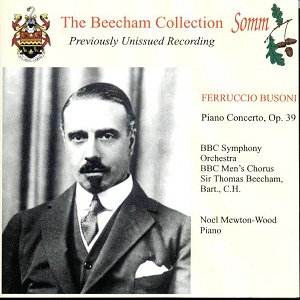Previously unissued
this Busoni release in the Beecham Collection
makes an effect every bit as electrifying
as Sommís earlier 1937 Leeds Missa
Solemnis. What is even more remarkable
is that Beecham only conducted two works
by Busoni during his career; a single
performance of the Violin Concerto in
D with Alma Moodie and the Piano Concerto
of which he gave two performances on
successive evenings with Noel Mewton-Wood.
By some grim alchemy both these Australian
soloists were suicides Ė Moodie in wartime
Berlin and Mewton-Wood in London in
1953. And to further the connection
Moodie was a pupil of Carl Flesch one
of whose leading pupils, Max Rostal,
was Mewton-Woodís last sonata partner.
It was a busy time
for Beecham in January 1948. On the
third and fourth he performed the Busoni
alongside Haydnís Symphony No. 103.
On the fourth he was also in the studios
with his newly formed Royal Philharmonic
recording Mozartís Symphony No. 27 and
the Divertimento K131 and, nothing daunted,
from the fifth to the tenth he put on
Gounodís Faust. Even so the Busoni performances
were remarkable and reunited Beecham
with the soloist whose London concerto
debut heíd conducted eight years earlier
when Mewton-Wood was seventeen. As for
the young Australian he was to record
Busoniís Second Violin Sonata with Rostal
but otherwise this is the only example
of his coruscating playing of the composerís
music.
Itís not immediately
clear from which performance this recording
derives or whether there has been some
patching from both. There are the inevitable
ticks and pops and a ration of surface
noise but in the main the sound is remarkably
well focused and has a necessary clarity
to it. Certainly listening pleasure
is not remotely impeded by the non-commercial
circumstances of the recording. As for
the performance, it is simply blazing.
More even than that it is notably well
argued architecturally, the edifice
falling securely into place and perhaps
doing something to refute the (in some
quarters) renewed view of Beecham as
an epicene miniaturist incapable of
handling symphonic or concerto form.
This misguided generalization is shown
here in Beechamís handling of the orchestral
part to be more than usually commonplace.
He brings out a significant amount of
textual detail, right from the powerful
sense of direction he imparts to the
Introduction, and the ensuing bass line
and wind cantabile are etched with superb
refinement and sympathy. The thunderous
outburst at 8.10 is matched by equal
conviction, as is the scintillation
of the Pezzo giocoso. Mewton-Wood and
Beecham treat the long slow movement
with apt understanding of both its eruptive
and determined profile, its ever changing
sense of direction; the pianistís dramatic
virtuosity here and Beechamís marshalling
of wind counterpoint is superb.
Thereís great clarity
in the Allíitaliana tarantella with
crisp rhythm and vivacious trumpets.
Inevitably Mewton-Wood is not finger-perfect
but in a live performance at such a
frequently incendiary tempo (some of
it is really fast) this is not simply
unsurprising but also inconsequential.
I should also note that the animated
humour at the end of this movement and
the charming phrasing are entirely winning.
In the Cantico finale Beecham draws
upon the hymnal mysticism inherent and
though the choir is somewhat lugubrious
nothing can dim the fires of the triumphant
conclusion.
This is playing that
pianistically speaking can be measured
against that of Egon Petri and though
enough (near) contemporary recordings
exist to lure the ear (Hamelin, Ohlsson,
Ogdon et al) this exceptionally rare
survivor deserves the widest possible
scrutiny and admiration.
Jonathan Woolf
You might also be interested
in the August recording of the Month
and Gramophone Critic's Choice:
Mewton-Wood
plays Twentieth Century Piano Concertos
Arthur
BLISS (1891-1975)
Piano Concerto (1938-39) [37.36]
Igor STRAVINSKY (1882-1971)
Concerto for piano and wind instruments
(1924) [20.06]
Dmitri SHOSTAKOVICH
(1906-1975)
Concerto for piano, trumpet and strings
Op. 35 (1933) [21.08]
 Noel Mewton-Wood (piano)
Noel Mewton-Wood (piano)
Harry Sevenstern (trumpet) (Shostakovich)
Utrecht Symphony Orchestra (Bliss);
Residentie Orchestra, The Hague (Stravinsky);
Concert Hall Symphony Orchestra
Walter Goehr (conductor)
rec. 1952 (Bliss, Stravinsky); 1953
(Shostakovich). mono. ADD
Transferred by Bryan Crimp from LPs
drawn from the collection of Robert
Milnes
Financial assistance from the Bliss
Trust
Originally issued as Concert Hall LPs:
CHS1167 (Bliss); CHS1160 (Stravinsky);
CHSH4 (Shostakovich)
 BRITISH MUSIC SOCIETY HISTORIC
BMS101CDH [79.00]
BRITISH MUSIC SOCIETY HISTORIC
BMS101CDH [79.00]
